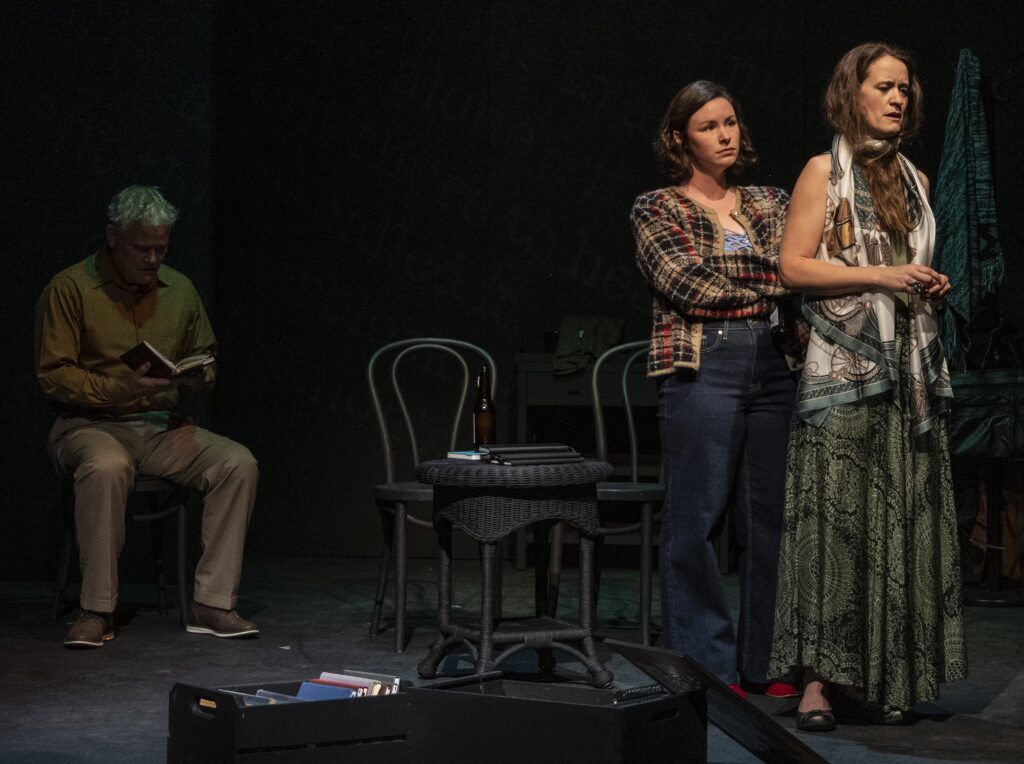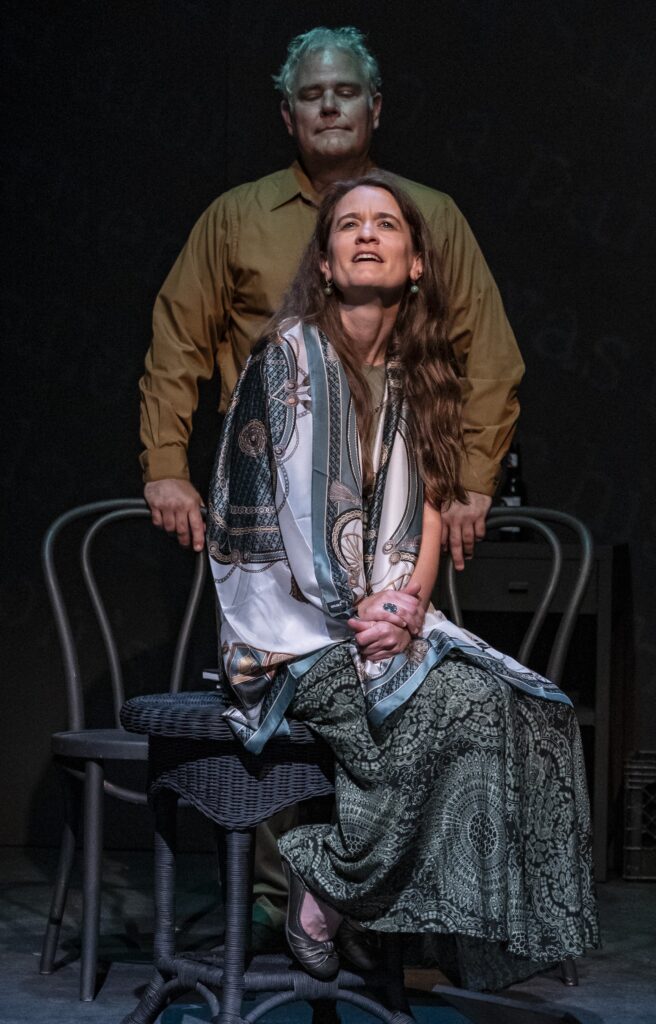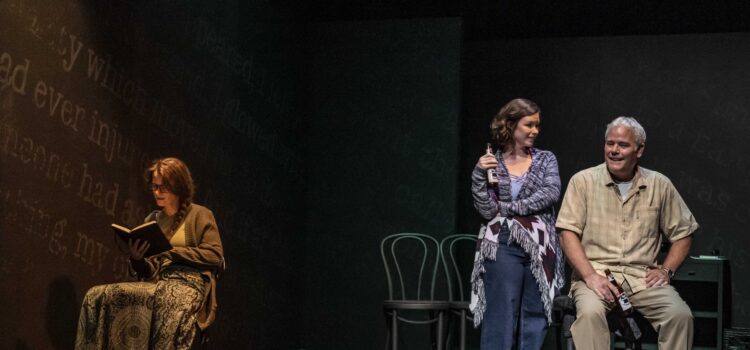By Lynn Venhaus
Sympathies shift as does time in the twisty relationship drama “Fiction,” presented by the St. Louis Actors’ Studio as a study in the stories we tell ourselves.
Playwright Steven Dietz explores “What would you do if you had to live with a secret that you thought you would die with?”
That complicates life for sophisticates Linda and Michael Waterman, who are both writers, thus the verbal jousting throughout the two acts.
Their literate lives will be turned upside-down with the diagnosis of a terminal brain tumor (hers) and the revelation of an affair (his).
After Linda’s devastating news, she asks her husband to share his diaries with her. Who can refuse a dying person’s wish, right? He agrees – tearing out a page – and his entries disclose what happened at a writer’s retreat with a young Abby, an administrator at The Drake Colony. Rut-ro.
With his customary witty dialogue, Dietz examines the blurred lines between fact and fiction, truth and lies, reality and imagination. Does discretion spare pain or make betrayal worse? Can couples overcome deceit? Is “memory the better writer” as Michael states?
And what kind of mind game are we exactly in for here?
As cagily played by Lizi Watt as Linda and William Roth as Michael, their carefully constructed worlds come to a head when they are forced into edgy territory – and are backed into a corner.
The very opinionated and glib Waterman defends his journaling by describing it as fiction. A rather stressed Linda conjures up scenarios in her head, as she thinks she knows him well enough to figure out what happened. He described Abby as a lethal combination of beauty, danger, youth and wit.
As they revise facts, trust breaks down. Then Michael reads Linda’s diaries. Well, who is keeping secrets now? And what isn’t disclosed on the hand-written pages?
What a tangled web Dietz has weaved into two hours, adding plot twists – and a few contrivances to make this more confounding rather than easily filling in the blanks.

What the Watermans have been telling themselves for 20 years is that their longtime relationship is built on honesty and candor. After all, they are writers. But the irony is that sometimes, those adept at the written word aren’t always the best communicators when it comes to expressing feelings and deep thoughts one-on-one.
Confrontations will expose vulnerabilities and appear to be ripping scabs off old wounds. And what’s with this mysterious Abby, and how long was she in contact with Michael? How does she know Linda?
Agile at rapid-fire banter, Watts and Roth are convincing, if not enitrely relatable, as the pair – his character tends to pontificate, and her healthy self can get snippy, but you do feel for her current predicament. His novels are so popular they’re made into movies while her one acclaimed book, “At the Cape,” a fictionalized account of her sexual assault in South Africa, is long in the rearview mirror, and she now teaches creative writing. Linda is tough and confident, not a pushover.
As Abby, Bryn McLaughlin plays her close to the vest when she appears before and present, shading her ambiguously. She holds her own in scenes with the older established characters.
This three-hander, deftly staged by Wayne Salomon, digs deeper into the gray areas of relationships that aren’t so black-and-white. Salomon’s a master at dissecting ordinary people and their motivations, as he has shown in an illustrious career spanning 50 years.
In recent years at STLAS, he’s done sharply defined work with “August: Osage County,” “Three Tall Women,” and “Farragut North.” This one, with its enigmatic premise, is indeed a challenge.
While the actors are smooth and obviously well-rehearsed, given the dexterity on display and their earnest analysis to make the material understandable, the stumbling block is the play’s structure.
The time shifts are not always clear, which is intentional. There are minor changes in costumes to reflect the year depicted, a smart move by costume designer Carla Landis Evans.
When we first meet the couple at a café in Paris (really?), they seem to have a comfy rapport. Dietz’s idea to start with a high-spirited argument on best rock vocal performance is clever, for we immediately ascertain they’re Boomers, with each taking a side – he’s adamant it’s John Lennon in “Twist and Shout,” and she’s making a case for Janis Joplin for “Piece of My Heart.”
Music, being the universal language, helps us size up the characters. But turns out, this is their first meeting, and they eventually marry. It sets up their rhythms, for couples tend to have their own shorthand..
This shift in time will keep us off-guard, particularly with the back-and-forth on the Abby sequences, and perhaps more at a distance that we should be as we’re trying to keep straight what’s accurate.
Then, there is the matter of mortality. The reason she’s reading his diaries is that she’s going to die soon (three weeks, or as she puts it, “twenty meals.”) Spoiler alert: But then, lo and behold, doctors say ‘oops!’ and never mind — due to an “oncological misapprehension,” she’s given a reprieve, so that makes things stickier for what’s out in the open. But then… (won’t spoil the rest). And if she has a malignancy tumor, undergoing treatment, wouldn’t that affect her behavior?
These choices are debatable, and the off-kilter nature can be frustrating, if that’s how you sense it. I can see where deciphering the relationships can become chore-like.
In all narratives, talking about writing can get in the weeds with theatergoers, while showing the writing process is even trickier. I can see responses vary about the two.
Should our lives be an open book in our intimate relationships? Dietz brings up questions, but are his points persuasive?
Are the characters unreliable narrators? Things are open to interpretation, depending on your viewpoint. And given human nature, perspectives will vary.
The setting, designed by Patrick Huber and carried out by Andy Cross and Sarah Frost, is minimally staged to focus on the verbal fireworks. No bookshelves, such as those artfully staged for Zoom, for the backdrop.
St. Louis Actors’ Studio, now in its 15th season, is looking through the lens of life’s fundamentals in several productions this year.
Their selections always bring up provocative issues that make a viewer consider how they think and feel, which results in an interesting experience worthy of discussion.
“Fiction” was produced in a workshop setting through ACT Theatre in Seattle in 2002, then presented at the McCarter Theatre in Princeton, N.J., and later, off-Broadway by the Roundabout Theatre in 2004.
Active for 30 years, the prolific Dietz is one of the most widely produced playwrights in the U.S. Locally, his works “Bloomsday” and “This Random World” have been performed by the West End Players Guild. “God’s Country,” “The Nina Variations,” “Lonely Planet,” “Shooting Star” and “Private Eye” are among his many plays, often staged in regional theaters. Always witty and frequently insightful, Dietz’ comedy-dramas intrigue.
This much I know is true – the truth is uncomfortable but lies are worse. Although this brings up thought-provoking topics, whatever Dietz was going for in “Fiction” doesn’t land wholly satisfactorily, although the performances are genuine and the production work sincere.

The St. Louis Actors’ Studio presents “Fiction” by Steven Dietz from Oct. 7 to Oct. 23, on Fridays and Saturdays at 8 pm and Sundays at 3 p.m. at The Gaslight Theater at 358 N. Boyle in the Central West End.
For tickets, visit https://www.ticketmaster.com/the-gaslight-theater-tickets-st-louis/venue/50324 or purchase at the box office prior to showtime. For more information: www.stlas.org

Lynn (Zipfel) Venhaus has had a continuous byline in St. Louis metro region publications since 1978. She writes features and news for Belleville News-Democrat and contributes to St. Louis magazine and other publications.
She is a Rotten Tomatoes-approved film critic, currently reviews films for Webster-Kirkwood Times and KTRS Radio, covers entertainment for PopLifeSTL.com and co-hosts podcast PopLifeSTL.com…Presents.
She is a member of Critics Choice Association, where she serves on the women’s and marketing committees; Alliance of Women Film Journalists; and on the board of the St. Louis Film Critics Association. She is a founding and board member of the St. Louis Theater Circle.
She is retired from teaching journalism/media as an adjunct college instructor.

